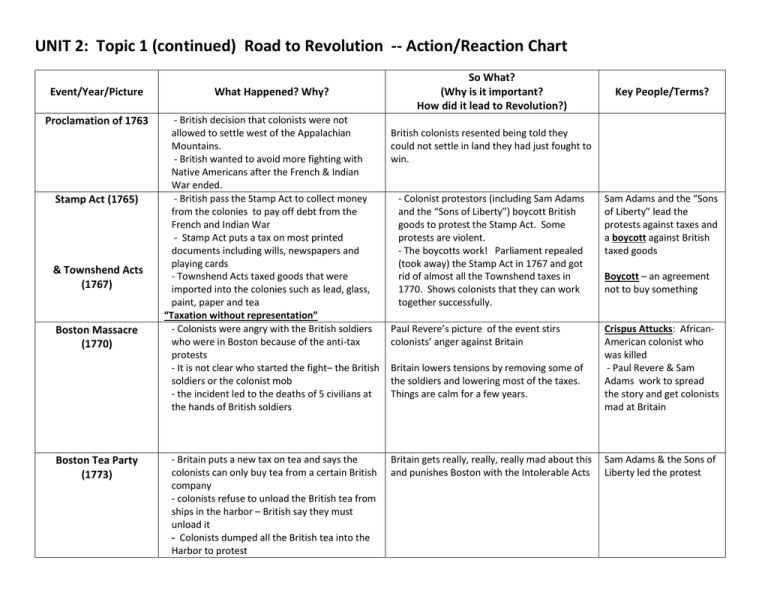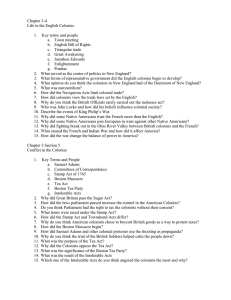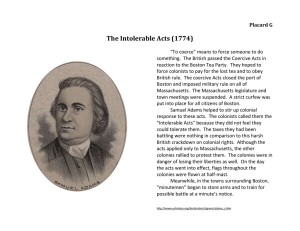UNIT 2: Topic 1 (continued) Road to Revolution ...
advertisement

UNIT 2: Topic 1 (continued) Road to Revolution -- Action/Reaction Chart Event/Year/Picture What Happened? Why? Proclamation of 1763 - British decision that colonists were not allowed to settle west of the Appalachian Mountains. - British wanted to avoid more fighting with Native Americans after the French & Indian War ended. - British pass the Stamp Act to collect money from the colonies to pay off debt from the French and Indian War - Stamp Act puts a tax on most printed documents including wills, newspapers and playing cards - Townshend Acts taxed goods that were imported into the colonies such as lead, glass, paint, paper and tea “Taxation without representation” - Colonists were angry with the British soldiers who were in Boston because of the anti-tax protests - It is not clear who started the fight– the British soldiers or the colonist mob - the incident led to the deaths of 5 civilians at the hands of British soldiers Stamp Act (1765) & Townshend Acts (1767) Boston Massacre (1770) Boston Tea Party (1773) - Britain puts a new tax on tea and says the colonists can only buy tea from a certain British company - colonists refuse to unload the British tea from ships in the harbor – British say they must unload it - Colonists dumped all the British tea into the Harbor to protest So What? (Why is it important? How did it lead to Revolution?) Key People/Terms? British colonists resented being told they could not settle in land they had just fought to win. - Colonist protestors (including Sam Adams and the “Sons of Liberty”) boycott British goods to protest the Stamp Act. Some protests are violent. - The boycotts work! Parliament repealed (took away) the Stamp Act in 1767 and got rid of almost all the Townshend taxes in 1770. Shows colonists that they can work together successfully. Paul Revere’s picture of the event stirs colonists’ anger against Britain Britain lowers tensions by removing some of the soldiers and lowering most of the taxes. Things are calm for a few years. Britain gets really, really, really mad about this and punishes Boston with the Intolerable Acts Sam Adams and the “Sons of Liberty” lead the protests against taxes and a boycott against British taxed goods Boycott – an agreement not to buy something Crispus Attucks: AfricanAmerican colonist who was killed - Paul Revere & Sam Adams work to spread the story and get colonists mad at Britain Sam Adams & the Sons of Liberty led the protest Event/Year/Picture What Happened? Why? Intolerable Acts - As a result of the Boston Tea Party, Britain passes the Intolerable Acts (also called the Coercive Acts) to PUNISH Boston and the Massachusetts colonial assembly - The Acts shut down Boston Harbor, established martial law, closed the colonial assembly, and set up the Quartering Act, which forced colonists to house soldiers in their vacant buildings In response to the Intolerable Acts, the colonists begin to communicate and work together. Colonists met in Congress in 1774 to support the protests in Massachusetts and organize boycotts and protests across the colonies They send a letter to Parliament with their grievances (complaints) Parliament ignores them. First Continental Congress Lexington & Concord Second Continental Congress - British troops marched to Lexington and Concord (towns near Boston) to arrest Sons of Liberty leaders and take the militia’s weapons - British troops are surprised by the militia (Minutemen) and fight a small battle (skirmish). They lose lots of soldiers and are forced to retreat back to Boston. - Met to plan after Lex & Concord. -Sent the “Olive Branch Petition” to King George for peace – he ignored it - Formed the Continental Army out of colonial militias and put George Washington in charge - Served as the colonial govt all during the war So What? (Why is it important? How did it lead to Revolution?) - The colonists organize to protest the Intolerable Acts, not just in Boston, but in other colonies. (“If it can happen in Boston, it could happen in my colony”) - The Acts show the colonists just how unfair the British can be, and make them want selfgovernment even more - Colonists start to organize and work together This is the first time the colonies have met together as a group to coordinate action together – a big step. The delegates risk arrest to attend – the British do not want the colonies meeting together People in the colonies start to form militias and prepare to defend themselves “Shot heard ‘round the world” – the name for the first shots fired in the war for independence. Not really heard around the world….just a saying that the impact of this war was huge. No one knows which side shot first. Colonial Minutemen prove they can fight against the British. - Agreed on the Declaration of Independence - Wrote the Articles of Confederation (the nation’s first constitution) Key People/Terms? Martial Law - rule by force (govt/police/ military), instead of by civilian courts. People’s rights are taken away Intolerable: can’t stand it Coercive: forcing you to do something Grievances – complaints John Adams, Sam Adams, Patrick Henry, George Washington-- the leaders in each of the colonies (except Georgia!) Militia – a group who form together to protect their town. Not an army – just a loosely organized local group. Minutemen: men serving in the town militia who could be ready to fight at a minute’s notice Thomas Jefferson, Ben Franklin, John Hancock





